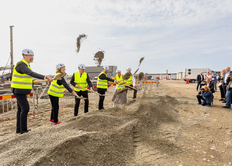- The plant will process 35,000 tonnes of peas and 5,000 tonnes of faba beans annually.
- Completion is expected in the first half of 2027, creating 30 jobs.
- The facility spans 5,300 square meters and uses 1,000 tons of structural steel.
- The project received support from Klimatklivet.

Overview
The new plant in Lidköping will focus on producing plant-based proteins primarily from peas, with faba beans as an additional raw material. Annually, it will process approximately 35,000 tonnes of peas and 5,000 tonnes of faba beans, resulting in 7,000 tonnes of protein isolate. This initiative aims to increase Swedish pea cultivation by 50%, from 80,000 to 120,000 tonnes.
Timeline and Impact
Scheduled for completion in the first half of 2027, the plant will create around 30 new jobs. The facility will cover 5,300 square meters, constructed with 1,000 tons of structural steel and supported by 16,000 meters of concrete piles. During construction and in adjacent industries, hundreds of additional jobs are expected to be generated.
Sustainability and Benefits
Peas and faba beans are considered climate-smart crops, requiring minimal water and nutrients while enriching the soil with nitrogen. By increasing the use of domestically grown plant-based proteins, the project aims to reduce the reliance on imported soy, enhancing sustainability in Swedish food production.
Support and Collaboration
The project has received backing from Klimatklivet, a Swedish initiative supporting climate-friendly projects. The new plant will complement existing facilities in Norrköping, Kimstad, and Lidköping, further strengthening the production of plant-based proteins in Sweden.

